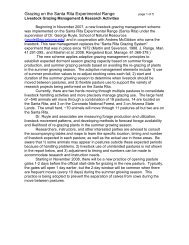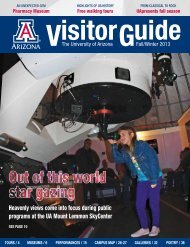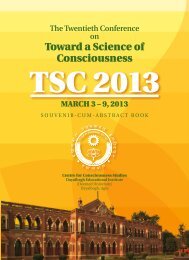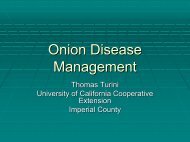CONSCIOUSNESS
Download - Center for Consciousness Studies - University of Arizona
Download - Center for Consciousness Studies - University of Arizona
- No tags were found...
Create successful ePaper yourself
Turn your PDF publications into a flip-book with our unique Google optimized e-Paper software.
62 1. Philosophy<br />
*is* the subject in whom phenomenal states are unified. All interactions in the mind have two<br />
sides: they entail both phenomenal experience *and* a physical causal role. Physical causal<br />
closure is maintained because the mind is a non-material entity with physical attributes, whose<br />
structures can act causally on neural processes. The domain of what constitutes “the physical”<br />
must necessarily be expanded. P7<br />
46 Identifying the Most Likely Explanation of Consciousness (Part 1): IBM and The<br />
SCALP Method Colin Morrison (Philosophy, Independent Researcher,<br />
Fife, Scotland, UK, Cupar, Fife United Kingdom)<br />
In this paper I propose that the proliferation of diverse and often incompatible views<br />
on consciousness in the philosophical literature is due largely to the fact that philosophers<br />
tend to be influenced by their intuitions when deciding which position to subscribe to, and<br />
I argue that this situation is extremely unsatisfactory. There are three main reasons for this:<br />
Firstly, it is clear from the history of science that human intuitions are not a reliable guide to<br />
a successful scientific explanation. Popular hypotheses have all too frequently been shown<br />
by experiment to be inadequate, and our explanations for things seem to have become ‘more<br />
and more unreasonable and more and more intuitively far from obvious’ (Richard Feynman<br />
1965). Secondly, our best explanation for the origin of our intuitions, Darwinian evolution,<br />
gives us no reason to think they would make the most likely position on consciousness seem<br />
most likely to us. And thirdly, the private nature of subjective experience makes it unlikely<br />
that the results of experiments will ever be sufficient to rule out all wrong intuitions on this<br />
subject. For those reasons it is argued that whether a particular position on consciousness feels<br />
likely or not ought to be regarded as COMPLETELY IRRELEVANT when assessing whether<br />
or not that position is the most reasonable one. Instead, it is proposed that this assessment be<br />
based purely on fully justifiable estimates of the probability of that position (and of each alternative<br />
hypothesis) being true. Although our inability to justify inductive inference appears<br />
to prevent us from calculating the probability that a hypothesis is absolutely true, I believe I<br />
have successfully developed a method of approximating the probability that a hypothesis is<br />
true given that certain well-supported scientific theories are correct. My proposal (dubbed<br />
‘inference from the best methodology’) requires that for each hypothesis on consciousness a<br />
general method of generating explanations for things be constructed that will not only yield<br />
the hypothesis in question when applied to the facts about consciousness, but will also (when<br />
applied to other facts) provide explanations for many phenomena for which well-supported<br />
scientific explanations are available. The probability that the hypothesis on consciousness<br />
is correct can then be approximated as the relative frequency at which that method, when<br />
applied to phenomena that have a reasonable number of features in common with consciousness,<br />
provides explanations that agree with the scientific explanations of those phenomena.<br />
Consequently, it is argued that the only way to construct a theory of consciousness that could<br />
be justifiably called “its most likely explanation” is by insisting that every aspect of that<br />
theory be determined by (or determinable from) a method of generating explanations that can<br />
be shown to provide ‘scientifically correct’ explanations for sufficiently relevant phenomena<br />
more often than can be achieved by any suitable alternative method. A proposal (dubbed ‘the<br />
SCALP method’ or ‘SCALPEL’) for that most successful method of generating explanations<br />
is developed and justified in this paper, and in a follow-up paper a theory of consciousness<br />
generated by that proposal is obtained. P1<br />
47 The Hard Problem of Concepts IS the Problem of Experience Joel Parthemore<br />
(School of Informatics, University of Sussex, Brighton, East Sussex<br />
United Kingdom)<br />
In theories of concepts, many attempts have been made to treat concepts as first, abilities,<br />
and only second, representations; as first basic (first-order) and only second, higher-order; as<br />
first private, and only second, public (or vice versa). The reason why none of these strategies<br />
works is, at heart, the same, and the same as the one Chalmer addresses in his ‘95 paper: the<br />
problem of experience and its enduring habit of mixing the seemingly objective (e.g., when<br />
we both measure the length of a certain stick, we get the same result, and we assume that,







